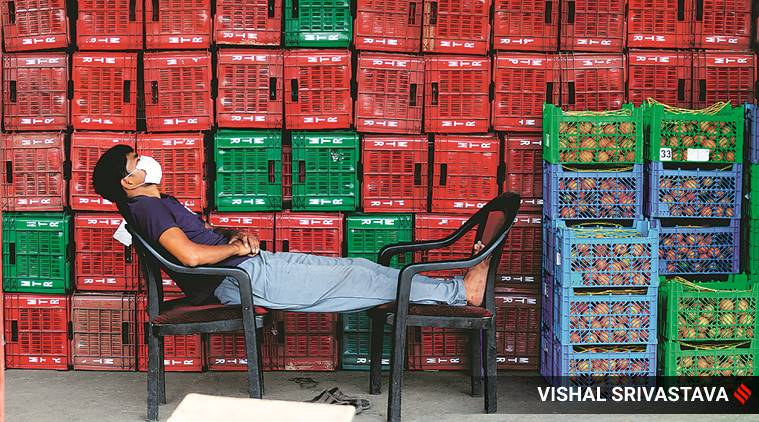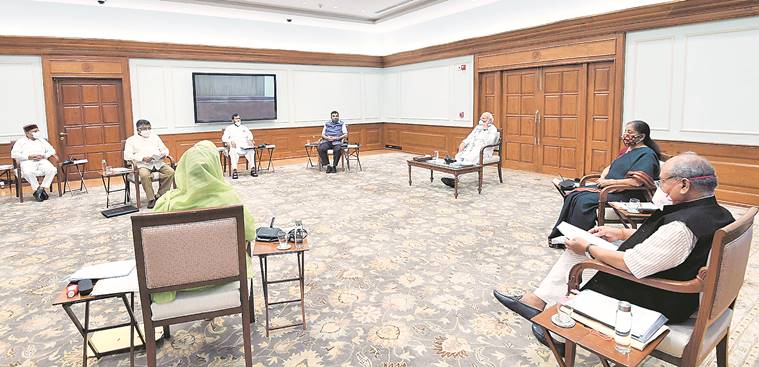 A worker at a fruit shop at the Naveen Galla Mandi in Lucknow on Thursday, after the UP government changed the limited sale timings — from day to late night hours — in order to discourage large gatherings of general buyers. Vishal Srivastav
A worker at a fruit shop at the Naveen Galla Mandi in Lucknow on Thursday, after the UP government changed the limited sale timings — from day to late night hours — in order to discourage large gatherings of general buyers. Vishal Srivastav
CLEARING THE way for significant reforms in the agriculture sector, the Union Cabinet on Wednesday cleared three ordinances aimed at lifting restrictions on key commodities such as cereals, pulses, onion and potato, and giving farmers the freedom to sell their produce directly or through e-trading platforms to entities of their choice instead of being confined to state mandis.
They also offer a legal framework that will enable farmers to enter into an “agreement” with private sector players on pricing and purchase — a step that can provide for contract farming.
The decision of the Cabinet, which will lead to the Essential Commodities Act of 1955 being amended, comes more than a fortnight after the reforms were first announced by Finance Minister Nirmala Sitharaman in the third tranche of the Centre’s Covid economic package.
Calling it a “historic day for agriculture”, Union Agriculture Minister Narendra Singh Tomar said the reforms will largely free the sector from a system of inspectors and permits.
“All the three decisions are important,” he said.
Over to the private sector
The key changes seek to free agricultural markets from the limitations imposed by permits and mandis that were originally designed for an era of scarcity. The move provides more choices for farmers to trade their produce, but its success will depend on how the private sector leverages the opportunity.
Pointing to the overhauling of the Act, he said: “When this was announced, some experts had said that the country got Independence in 1947 but farmers are going to get freedom after the promulgation of this ordinance”. Tomar said “this will ensure One India, One Agriculture Market”.
“The amendment announced will help both farmers and consumers while bringing in price stability,” said an official statement issued after the Cabinet meeting, which was chaired by Prime Minister Narendra Modi.
Referring to the amendment of the Act, which was suggested by NITI Aayog, the statement said: “This will remove fears of private investors of excessive regulatory interference.” The ordinance will also remove commodities like oilseeds and edible oils from various restrictions under the Act.
 Prime Minister Narendra Modi chairs the meeting of the Union Cabinet at 7 Lok Kalyan Marg in New Delhi on Wednesday. ANI
Prime Minister Narendra Modi chairs the meeting of the Union Cabinet at 7 Lok Kalyan Marg in New Delhi on Wednesday. ANI
The other two are new legislations enacted by the Centre. The Farming Produce Trade and Commerce (Promotion and Facilitation) Ordinance, 2020 and The Farmers (Empowerment and Protection) Agreement on Price Assurance and Farm Services Ordinance, 2020 are aimed at providing “barrier-free inter-state and intra-state trade” in agriculture produce and “eliminating intermediaries”.
The Essential Commodities Act was enacted at a time of food scarcity in the country, and allowed the government to notify a commodity as “essential” under section 2(A), take control of its production, supply and distribution, and impose a stock limit.
Under the amended Act, “the installed capacity of a value chain participant and the export demand of an exporter will remain exempted from such stock limit imposition so as to ensure that investments in agriculture are not discouraged”.
However, the government can still impose regulations on agriculture commodities in situations such as “war, famine, extraordinary price rise and natural calamity”. Any action on imposing a stock limit under the amended Act will be based on price triggers, such as a 100 per cent increase in retail price of horticulture produce and 50 per cent in non-perishable agricultural foodstuff over 12 months.
The Farming Produce Trade and Commerce (Promotion and Facilitation) Ordinance promotes “trade and commerce” outside the physical premises of markets covered by State Agricultural Produce Marketing legislation. So far, farmers had to sell their produce only at Agriculture Produce Market Committee (APMC) mandis. The ordinance also provides for an “electronic trading” transaction platform for agricultural commodities.
This move comes at a time when several states have already promulgated ordinances to allow farmers to sell their produce outside APMC market yards, apart from granting traders a unified licence to purchase from any mandi across the state.
The Farmers (Empowerment and Protection) Agreement on Price Assurance and Farm Services Ordinance, 2020 will allow farmers to engage directly with processors, aggregators, wholesalers, large retailers and exporters.
It will essentially allow farmers and buyers to enter into contracts in which the former is assured of a certain price at the time of sowing while the latter gets to procure the harvested produce at the pre-decided rate subject to quality norms.
Both parties will be insulated from excessive market risk, and the model agreements for different commodities will be prepared by the Agriculture Ministry. “Farmers will engage in direct marketing, thereby eliminating intermediaries, resulting in full realisation of price,” said the statement.
“No State Act will apply on the sale and purchase of agricultural products produced on the basis of such agreements. No mandi tax will be imposed, and no inspector will interfere… Farmers will get guaranteed price that will be determined on the basis of conditions mentioned in the agreement,” Tomar said. The two new ordinances also provide for a “separate dispute resolution mechanism” under which farmers can approach the designated district authority for grievance redressal in a time-bound fashion.